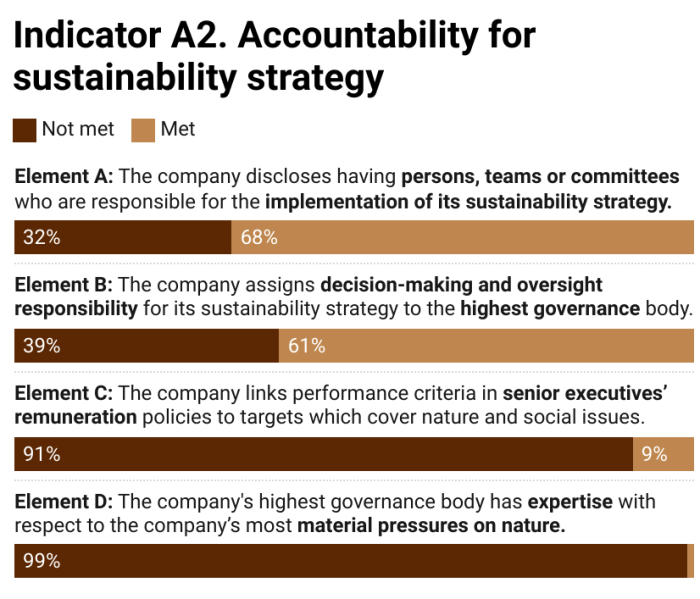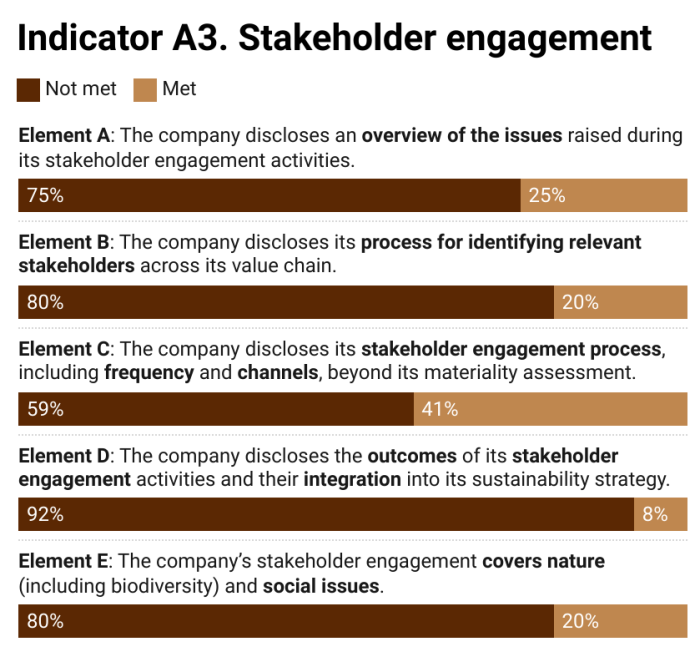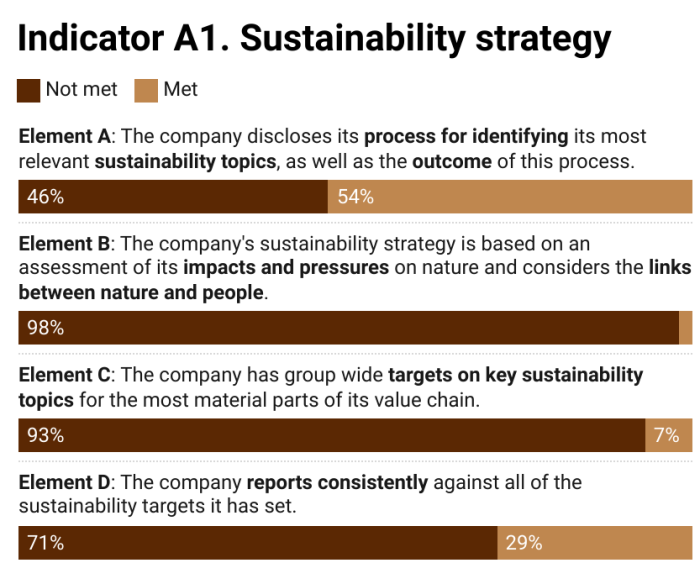Key finding
Increasing board accountability: more leadership needed at the top
Nature plays a crucial role in the global economy. More than half of global GDP is moderately or highly dependent on nature. Businesses rely heavily on nature to supply much-needed goods and services. Yet, corporate action on nature lags behind climate, comparatively receiving significantly less attention. It is no surprise, then, that 90% of experts call for companies to have a public nature strategy backed at the highest level. With a growing business case and mounting legislative pressure, companies must step up their actions when it comes to nature.
Transformative change must begin at the top. Nature is now an integral consideration for boards and there is increasing recognition that company directors have a legal obligation to take nature into account. Beyond being a necessity, a strong nature strategy presents an opportunity. The Nature Benchmark finds that companies which show robust corporate governance score significantly better on other sustainability issues. So how can businesses incorporate nature into their processes and strategy and contribute to a nature-positive and equitable future?
Start from the top
A key challenge for businesses is to understand the perspectives of their stakeholders. While 61% of companies have a sustainability strategy with board level accountability, only 1% of boards are equipped to understand their companies’ most material sustainability impacts (Figure 1). There is a skill and knowledge gap which results in boards taking on sustainability responsibility without having the relevant expertise. This is reflected in the poor performance of companies on our stakeholder engagement indicator, where less than 20% of assessed companies get a passing grade (Figure 2). A recent PwC study shows that nearly 60% of executives think their boards do not understand the concerns of stakeholders beyond shareholders.
However, best practices do exist, such as having board members with expertise in relevant areas or establishing specialized committees with direct access to the required knowledge. Ajinomoto Group, for instance, has a board of directors with expertise in social inclusion and direct access to advisors in nutrition, soil health, and environmental management, among other fields, through its Sustainability Advisory Council. It is critical for companies to adapt to their new role and become future-fit by upskilling or incorporating new sustainability profiles. Otherwise, they risk becoming obstacles to their own sustainability transformations. 

Prioritise, set targets and follow through
Only 29% of the 380 companies we assessed across the food and agriculture and paper and forest industries consistently report on how they are meeting their sustainability targets, despite 54% undertaking a materiality assessment to identify and prioritize their sustainability impacts (Figure 3). This lack of consistent reporting against targets is concerning, as it is nearly half of the average observed across other industries that have been assessed by the Nature Benchmark. While conducting a materiality assessment is an important first step, it must be followed by concrete action. Therefore, when setting targets, companies should include a baseline, a timeframe, and regularly report their progress. It is also crucial to track the targets consistently without making changes midway. Companies like Unilever and Yara provide a centralized table of all targets and results, which enables stakeholders to easily track progress. Further guidance can be found in the ACT-D framework (Assess, Commit, Transform and Disclose) which serves as a foundation for disclosing nature-related information and transforming relationships with nature.

Ensuring that advocacy efforts are aligned with sustainability strategies.
It is extremely damaging for credibility if a public sustainability strategy is undermined by behind-the-scenes lobbying. Yet, lobbying remains a blind spot for companies, especially on nature-related issues. Only 31% of assessed companies disclose a basic – and often incomplete – list of their trade associations and less than 1% disclose a clear and detailed framework for assessing alignment of their trade associations with nature-positive policies. To ensure credible advocacy on nature, companies must map their links to trade associations and thoroughly assess their alignment with a nature-positive economy. They should also establish clear steps and deadlines for escalation in case of misalignment.
For detailed guidance, companies can refer to the Nature Strategy Handbook, which offers a practical guide to support developing a nature strategy, covering the requirements of leading frameworks and helping businesses contribute to a nature-positive and equitable future.
Insights authored by Nicolas Sauviat in collaboration with the Nature Benchmark Team